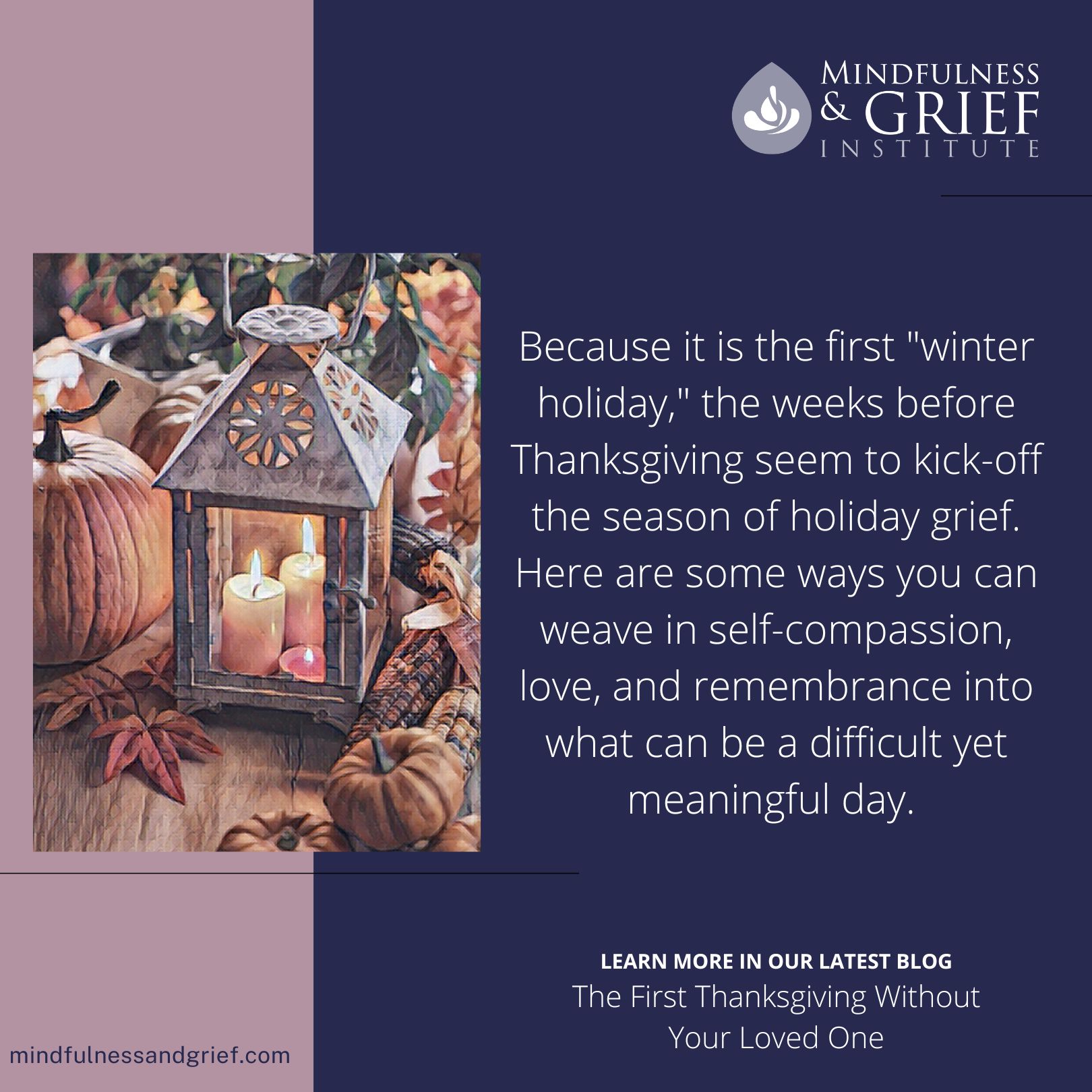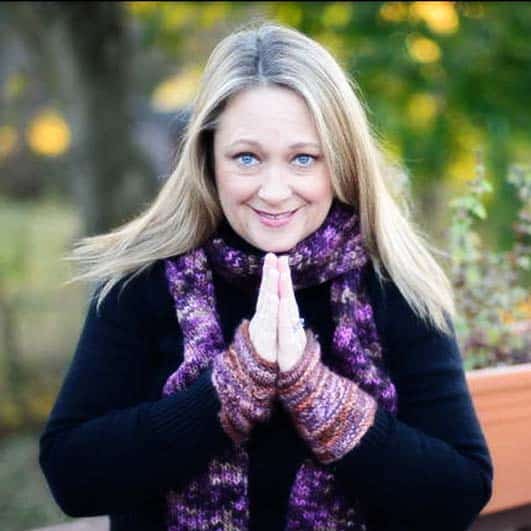The first Thanksgiving without your loved one probably has you feeling anxious, but you are not alone. What once may have been a favorite time of year now raises difficult feelings about how to cope with grief during the holidays.
Because it is the first "winter holiday," the weeks before Thanksgiving seem to kick-off the season of holiday grief. Here are some ways you can weave in self-compassion, love, and remembrance into what can be a difficult yet meaningful day.
Every year I facilitate an online Thanksgiving gathering for members of the Awaken Online Grief Support Group, and spend most of October, November, and December helping people navigate all the difficult emotions of the season.
The goal isn't just to survive the holidays. My hope is that eventually my clients will find a meaningful way to honor their love while tending to their loss.
Why Thanksgiving Is So Hard When You Are Grieving
We expect to spend quality time with the people we love during the holidays. This is the time of year that we engage in traditions that bring out our inner child, conjure up memories, and foster a sense of security, even as the world around us changes.
We yearn for feelings of love, gratitude, and compassion to fill our heart and soul. This Norman Rockwell ideal is difficult to live up to, even without grief as an unwelcome guest.
There are many examples of holiday strife, including forced visits with irritating relatives, arguments over political and religious views, and the financial challenges many of us face right before the big “giving season.” Grief amplifies it all.
Of course the pain of grief shatters our assumptive world well beyond the holiday season. While many of us would prefer to hunker down and come out when the season is over, the reality is that grief will still be there. It isn't the passage of time, but how you spend your time, that impacts how well you cope with grief.
That being said, if you want to tone down the holiday, or skip it all together, that is fine. What you do the first Thanksgiving doesn't have to be what you do next year or the year after that. If you are overwhelmed, and your energy is low, listen to your body and don't over plan.
How To Cope With Thanksgiving Grief
The first thing you can do to help ease anxiety is to practice self-compassion. Validate your own feelings, and know that there is nothing wrong with you if you dread a holiday without the person you love by your side. Be honest with yourself. Write it in your journal, and if you can, share with a trusted friend.
Next, spend a little time planning how you want to "be" on Thanksgiving. Similar to a grief anniversary reaction, the anticipation that builds weeks or months before the Thanksgiving holiday is a normal part of loss, but can contribute to feelings of anxiety and fear. Consider in advance how to handle holiday traditions, family gatherings, extended family visits, and even develop a solid self-care plan so you can get the support you need when grief triggers arise.
Many grieving people share that planning ahead helps them feel more in control, even if that plan gets tossed into the wind Thanksgiving Morning. Just because you plan it, doesn't mean you have to stick with it. Be flexible with your grieving self.
One of the most popular worksheets in my Awaken Online Grief Support Group is called "Special Day Planner" It is also in my guided journal, From Grief to Peace (pp. 114 - 115). The Special Day Planner walks you through a series of guided reflections. Here are a few examples:
- How are expecting to feel - or how do you already feel - about the special day?
- What can you do if you feel overwhelmed?
- Are their any objects you want close to you for memory or comfort?
- Who do you want to be around? Who do you want to avoid?
- What do you want to remember or feel on this special day/
This type of reflection is not only helpful during the winter holidays, but can be used for birthdays, anniversaries, angelversaries, and any other day that feels significant.
Finally, Acknowledging that this holiday season will be different without your person is hard, but true. Some members of your family may try to “power through.” The loss effects everyone in your family system, as well as some friends, and each person will have their own unique grief experience.
Tensions may run high during the first Thanksgiving for your family, and the one person you can control is you. Set yourself up for success by practicing self compassion and planning ahead, and you will probably be surprised how less anxious you will feel.
This year will be different than the last. It may be difficult and painful, but there may also be some special times, too.
My First Thanksgiving As A Grieving Child
My uncle died by suicide over 40 years ago on October 18th. I was only seven, and decades years later I am sure my memory is a bit fuzzy. But what I remember from that first Thanksgiving after my uncle's death has stayed with me.
My grandmother was the secretary for the First Baptist Church in Cary, North Carolina. She was an excellent cook who took great care in preparing all the southern staples for our holiday meals. Traditionally, my grandfather would hunt quail in the morning, and she would have them oven fried and ready to serve by mid-afternoon, surrounded by corn pudding, squash casserole, a bounty of garden grown vegetables, mashed potatoes, and homemade gravy.
Although her son had died just over a month before Thanksgiving, she tried her best to replicate holidays past. She prepared the lavish meal, but gone was the joy. The tone was set by her—that to acknowledge the grief we were feeling was unacceptable. I remember watching most of the grown-ups pretend that everything was okay, which was awkward and painful. It felt like my mom and I were the only ones who knew it wasn't.
Of course, hindsight is 20/20. But there were a lot of things we could have done to incorporate our memory of my uncle into the holiday—were it “allowed.” We could have set a chair at the table in his honor, or shared our favorite memory with him. A candle could have been lit to remind us of his spirit, or a prayer said for all of us in pain. My grandmother could have given herself a break from cooking, and instead we could have gone to a restaurant. However, I imagine staying busy was helpful for her. Cooking provided a sense of normalcy in an abnormal situation.
My grandmother's coping style was denial—that first Thanksgiving and beyond. While she never showed it outwardly, I know the pain inside was indescribable and without end. When she died at the age of 99 ½, she still held to the story that her son had been robbed at gunpoint, a tale so ingrained by that time that she believed it to be fact.
Ways to Honor Your Loved On This Thanksgiving
Reflect on how you would like to honor your special person this holiday season. It may be in conjunction with family members and friends, or it may be a private ritual just for you. Take a moment and brainstorm ways you would like to honor your special person this Thanksgiving. Here is a list to help you get started:
- Prepare their favorite food with loved ones and hand out copies of the recipe to friends
- Share favorite holiday memories of your loved one in your journal or with friends and family members
- Create a slideshow of your favorite photos, or make copies and create a collage to have on display during Thanksgiving gatherings
- Light a candle at the table to represent their everlasting impact on you and your family
- Set a place at the table to remain empty in their honor and as an acknowledgment that they may not be physically present, but they are still loved
If grief has entered your heart this holiday season, know that dreading the holidays is not unusual. It is normal. While you did not choose this loss, you can plan ahead and make choices on how to cope with the first Thanksgiving without your loved one. Acknowledge that what has happened has really happened, and it hurts. To pretend otherwise is not only untrue, but for many of us it just adds to our pain.



